10 Content Marketing Trends for Small Businesses in 2023
What’s hot in the content marketing industry? Learn about the top content marketing trends for small businesses and examples to inspire your content strategy.
 November 18, 2023
November 18, 2023 14 minute reading
14 minute reading
What’s hot in content marketing in 2023?
To anticipate which content marketing trends will carry through 2023, we spoke to several content marketing experts and industry thought leaders. They unpacked how their work is evolving and how they’re thriving in the face of the Metaverse, ChatGPT, and other changes and updates. They also shared insights based on the latest trends they’ve seen growing over the past year and what to expect.
This guide dives into the current and emerging data-backed content marketing trends you can implement and get ahead of the curve.
Top content marketing trends today
Content marketing trends come and go. For marketers, one of the biggest challenges lies in tracking:
Outgoing trends: Already on their way out
Current trends: Making waves at the present time
Emerging/New trends: Are on the rise or are taking shape
If you’re feeling overwhelmed by uncertainty and ever-changing trends, use our list of the top content marketing trends to put together a solid strategy for your business.
1. Quality content still trumps quantity
Quality over quantity has been a mainstay in content marketing.
Initially, websites, social media platforms, and search engines prioritized posting volume in their algorithms. Consequently, businesses churned out as much content as they could, often at the expense of staying on-brand or of quality output.
Quality content has proven time and time again that it's always worth the investment—even today. According to Semrush’s 2023 State of Content Marketing report, improving the quality and value of content was a top factor to 44% of businesses.
"Today, volume is not as essential as it once was,” says Brian Munce, Managing Director at Gestalt Brand Lab. “In 2023, there’s a much greater emphasis on how good the material you put out is. Google, for example, now rewards highly researched, long-form written content over the brief articles it used to favor. This is a win for businesses that can now focus their content marketing efforts on creating great work that truly aligns with their brand identity.”
And while the helpful AI-powered content trend may be impressive from a technical standpoint, small businesses should still prioritize quality content and craft over scale by enlisting the help of quality content writers.
Need help producing high-quality content? Check out Fiverr’s freelance content writers.
Find a content writer for hire
2. Efficiency will be a top priority
With economists predicting a highly likely chance of a global recession, businesses may respond by cutting operational expenses and laying off workers to be more efficient.
This efficiency trend will also be prominent in the content marketing space.
“Efficiency is the biggest trend,” says Andy Crestodina, Chief Marketing Officer at Orbit Media. “Content marketers are using tools to save time. AI is big, but also templates, repurposing, and collaboration. The time it takes to write a blog post has increased every year for the last nine years, according to our annual research on blogging statistics. 2023 may finally be the turning point.”

Source: Orbit Media
Source: Orbit Media
Most campaigns aim to produce something new. Efficiency will be about investing in programs you can streamline to do more with less, such as content repurposing.
For example, Orbit Media’s latest content campaign involves updating all of its Google Analytics articles for Google Analytics 4 (GA4) by:
Rewriting articles without changing their URLs
Optimizing articles for search by adding more details
Adding quotes from subject matter experts (SMEs) with fresh perspectives
Promoting the articles as though they were new (via email and social media)
“The prime example is our GA4 content marketing audit,” says Crestodina. “It used to rank okay for ‘content marketing audit,’ but now it ranks extremely well for ‘content marketing audit GA4’.Consider leveraging old URLs for a new campaign. It's an extremely efficient approach to SEO.”
In content repurposing, you can also convert an existing content piece into different formats. For example, you can select important statistics from an article to create infographics.
Small businesses will also need automation to self-serve and serve their customers with important and valuable information and flexible resources to stave off burnout and build relationships with external resources.
3. A shift to "why-to" content
Creating long content pieces isn’t enough for ‘depth’ to occur. You need a host of carefully selected subjects based on relevance and user interest to rank better.
A healthy cadence of quality content brings organic traffic to a website. That’s why you need in-depth content that contains expert knowledge on a wide range of related subjects around a focus topic and meets your audience’s needs.
In fact, search engine algorithms reward genuine efforts at providing depth and may penalize content that’s well-optimized but lacks enough substance to keep readers interested.
In 2023, small businesses will shift from the usual “how-to” content to “why-to” content.
“How-to content is typically very step-by-step, and it's very clear what the outcome of reading the article or watching the video is supposed to be,” says Matthew Ramirez, CEO at Paraphrase Tool.
“Why-to content is about exploring a topic in-depth and uncovering the ‘why’ behind a particular topic or subject. This type of content often raises more questions than it provides answers, but that's exactly what makes it so powerful. By raising questions and challenging assumptions, ‘why-to’ content can help readers think more deeply about a subject and take their understanding of it to the next level.”
Animalz, for example, creates exceptional why-to content in the form of thoroughly analyzed blog posts. The company understands the power of in-depth content and strives to create it to help their audience be successful in their work.
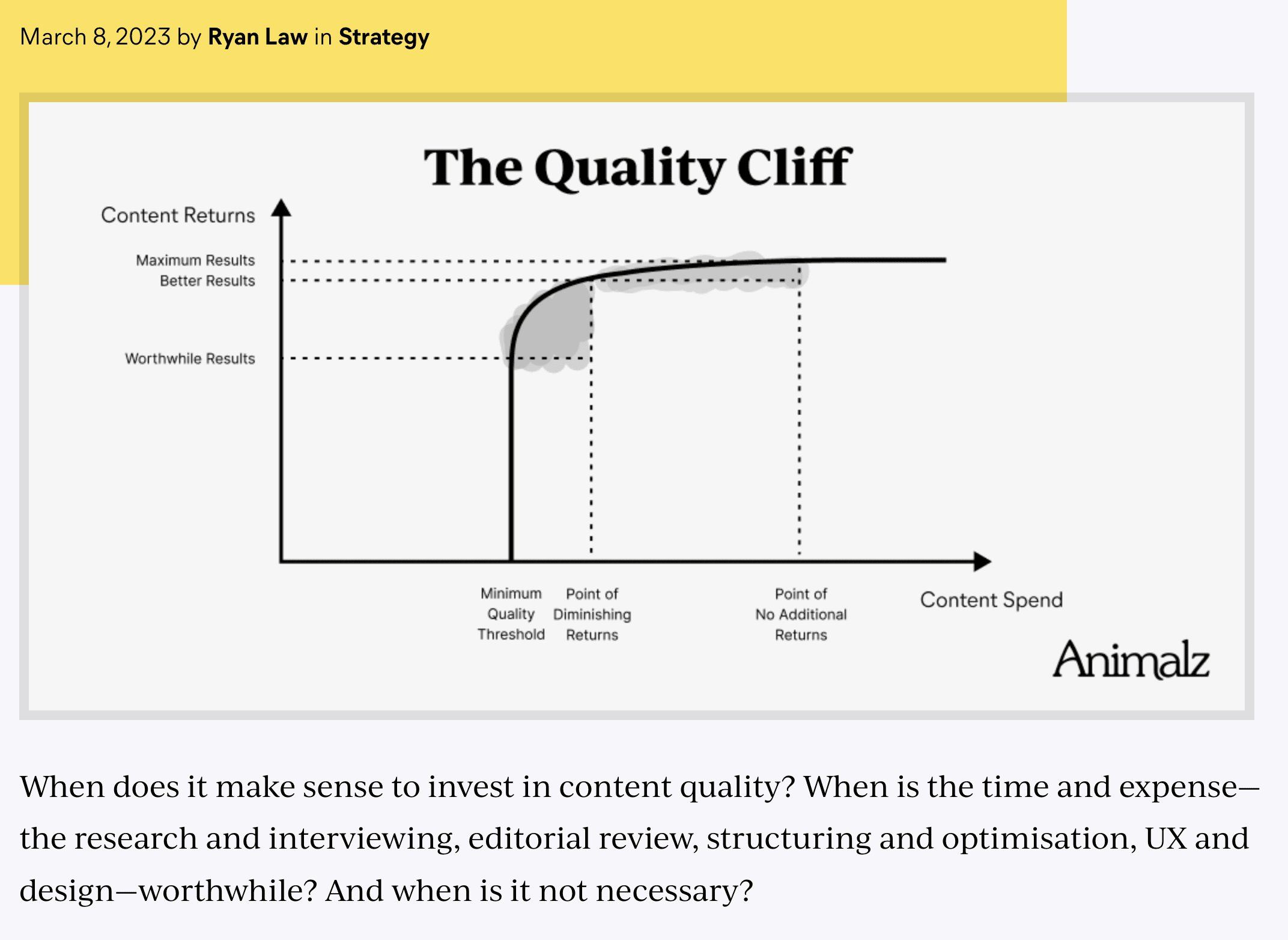
Source: Animalz
Source: Animalz
4. Growing emphasis on voice search optimization
Voice search is growing. By the end of 2023, voice assistants are expected to reach 8 billion, giving small businesses more opportunities to reach, connect with, and get more customers.
Users can ask more precise questions, making it easier and faster to get the information they need to make purchasing decisions.
"I've noticed a growing emphasis among small businesses on voice search optimization as a prominent trend in content marketing,” says Peter Bryla, Community Manager at ResumeLab.
“This shift is primarily attributed to the rising usage of intelligent assistants, contributing to the changing landscape of consumer behavior. For small businesses, this presents a favorable opportunity to enhance their content marketing, broaden their audience, and boost their visibility in Google search results.”
By implementing content optimization strategies tailored to voice search, small businesses can enhance their competitiveness and increase website traffic and conversions.
5. Short-form video content’s popularity will increase
Dr. James McQuivey was right: a minute of video is worth millions of words. It’s no wonder video marketing still rules the web today, especially when our attention spans are shortening.
Short-form videos in particular—such as those posted on YouTube Shorts, TikTok, Instagram Reels, or Snapchat Spotlight—will keep trending in 2023.
Businesses can post short, vertical videos with a 24-hour expiry and users can easily view them on their mobile devices as they navigate their social feeds.
The best part: viewers are more likely to pay attention to and engage with such videos. In fact, HubSpot’s State of Video Marketing in 2023 report shows that nearly all short-form videos are watched for more than 40% of their duration because of their quick runtime. 59% of them are watched for 41-80% of their length while 30% have an average watch percentage of more than 81%.
"Who doesn't love a good video that's short, sweet, and to the point?” says Maria Harutyunyan, Co-founder of Loopex Digital. “We’ll see more of these brief clips in the future, but SMBs should create engaging, high-quality, optimized videos that tell a story, provide value, and resonate with their target audience.”
For example, BRITA—a water filter manufacturer—leveraged the power of influencer marketing and collaborated withHope Watson on a short-form TikTok video tutorial about how to stay hydrated. In the video, Watson seamlessly slots the BRITA water bottle, naturally promoting the product.
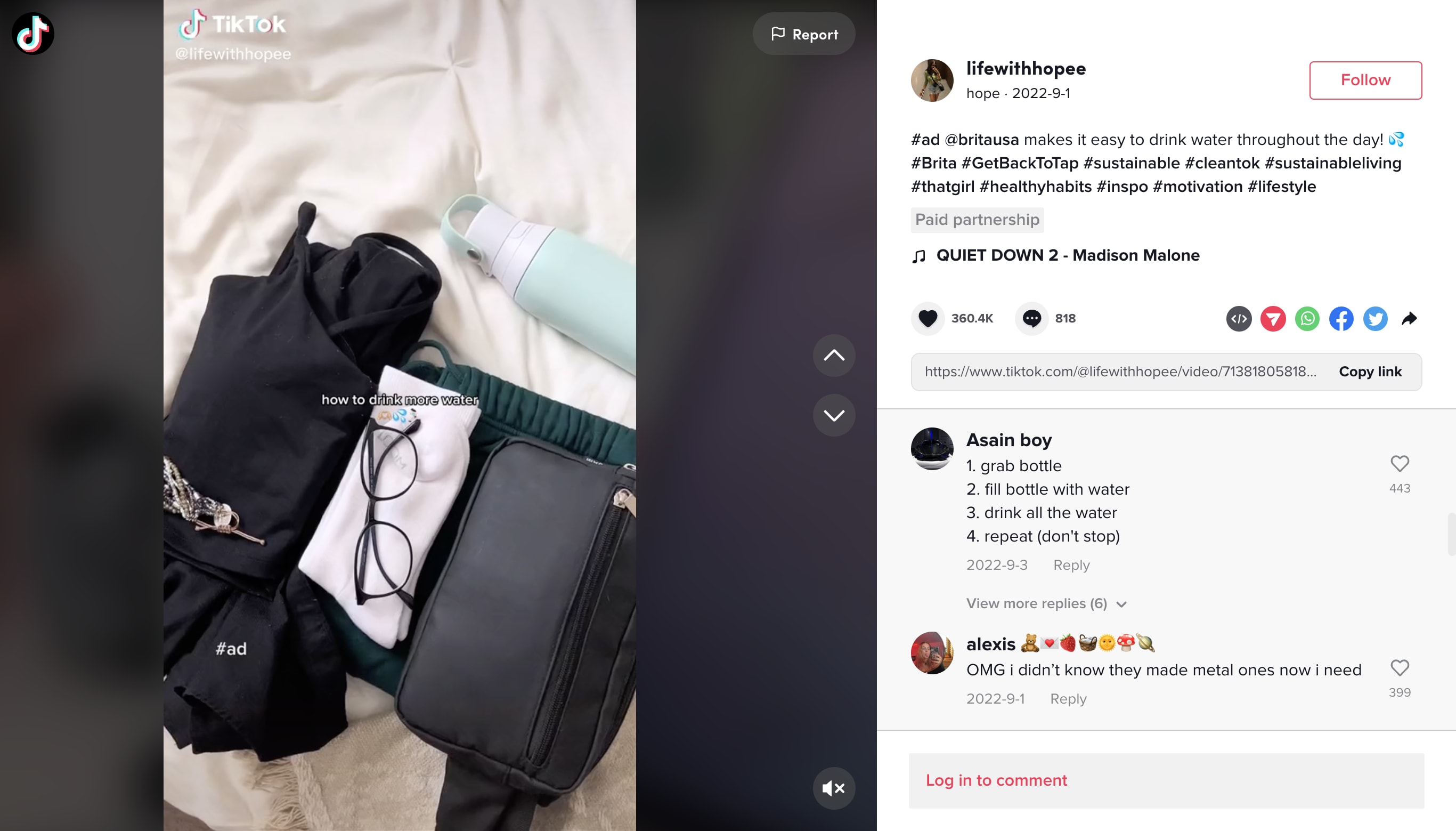
Source: Hope Watson
Source: Hope Watson
The video has racked up more than 44 million views and gained attention for BRITA’s product. Check out Fiverr Video ads services to create a custom shot form video ad.
6. Social search dominance is just beginning
Each month, people visit social media platforms more than search engines, spending nearly a third of their time there. Younger people are using social networks to research and evaluate brands, compare prices, and decide where to spend their money.
About 40% of 18-24-year-olds are using social platforms like TikTok or Instagram as their primary search engine—not Google Maps or Search.
To get ahead, you’ll need to master social search optimization basics.
For content marketers, social search optimization will be a make-or-break skill. It’s not too early to prepare your strategy for this trend.
7. Businesses will prioritize personalized and interactive content
In an experience-driven world, consumers expect constant updates at their fingertips.
How can businesses answer this call and still capture and keep their audiences engaged? Using authentic, memorable stories and interactions.
It’s easier to deliver interactive customer experiences in-person than through digital marketing channels. That’s why in 2023, small businesses will rethink content design with the end in mind—how customers need and want to experience the content. Instead of complex websites and microsites, businesses will prioritize personalized and interactive content that engages and entertains their customers.
“Personalization is becoming more important in content marketing,” says Haley Slade, CEO and Founder of Slade Copy House. “Personalized content is tailored to the individual user based on their interests, preferences, and behavior and is more engaging and effective than generic content.”
Beardbrand, for instance, capitalizes on people’s craving for personalized and interactive content. The company—which sells beard grooming products—has a beardsman personality quiz on its website.
The respondent answers several questions about their personality after which they’re taken to a landing page that reveals what type of beardsman they are—and get product recommendations based on their beardsman personality.
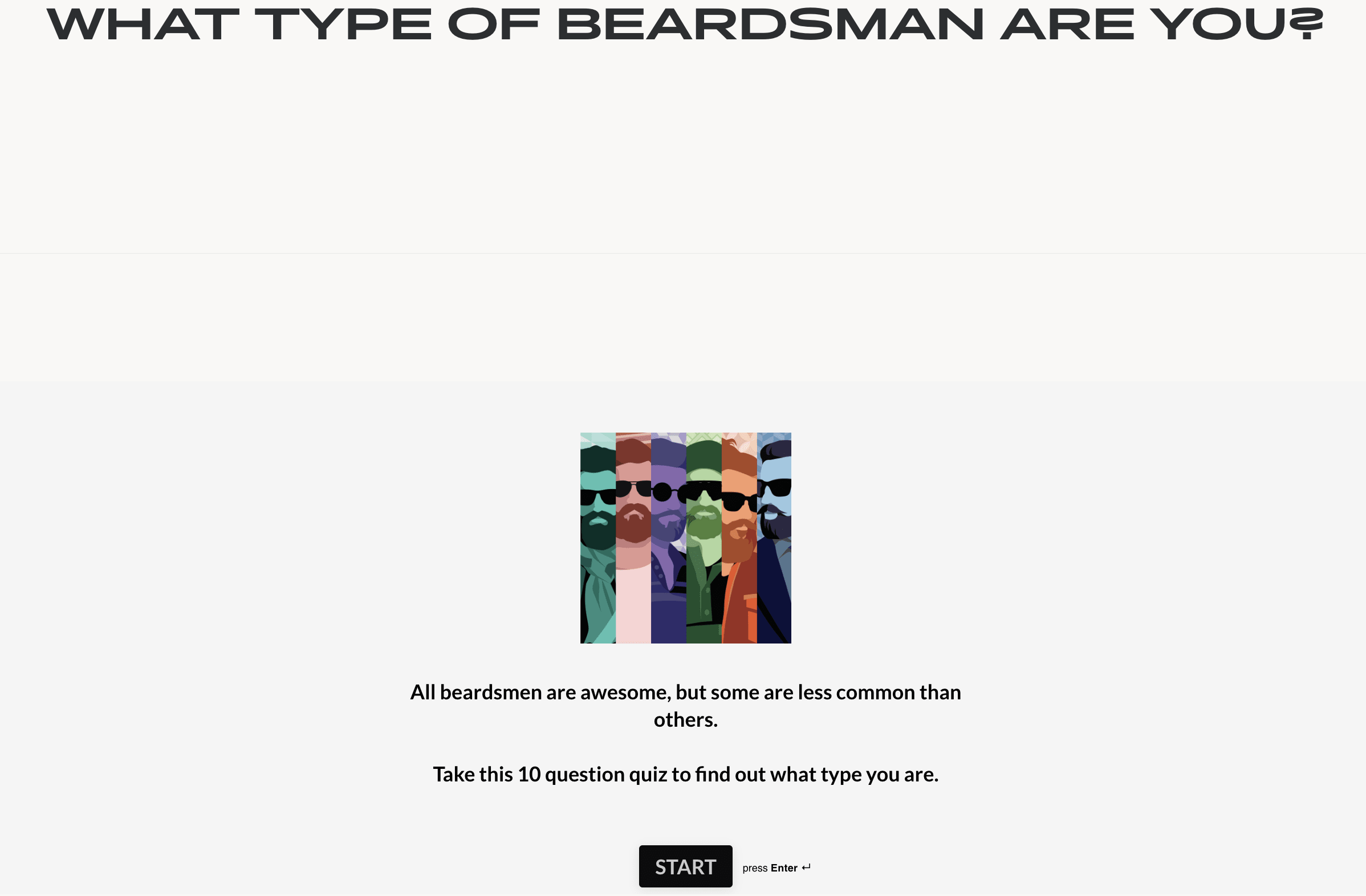
Through the Beardbrand quiz, the company:
Generated more than 150,000 leads
Earned tons of backlinks
Improves their products to meet customers’s needs
“Businesses that prioritize personalized and interactive content marketing, such as quizzes, surveys, polls, games, will gain an advantage in the crowded online marketplace and form strong relationships with their customers,” says Shaun Connell, Founder of Writing Tips Institute.
8. Paid newsletters are experiencing a boom
You have a great idea, target audience, and valuable or unique content to share—you’re well on your way to starting a paid newsletter.
Like magazine and newspaper subscriptions, people are happy to pay for newsletters as they opt for ad-free media. For instance, paid subscribers on Substack doubled from more than 250,000 to more than 500,000—and counting.
Alison Roman—a bestselling author and recipe columnist for Bon Appétit and The New York Times—runs a paid newsletter on Substack with 230,000+ subscribers.
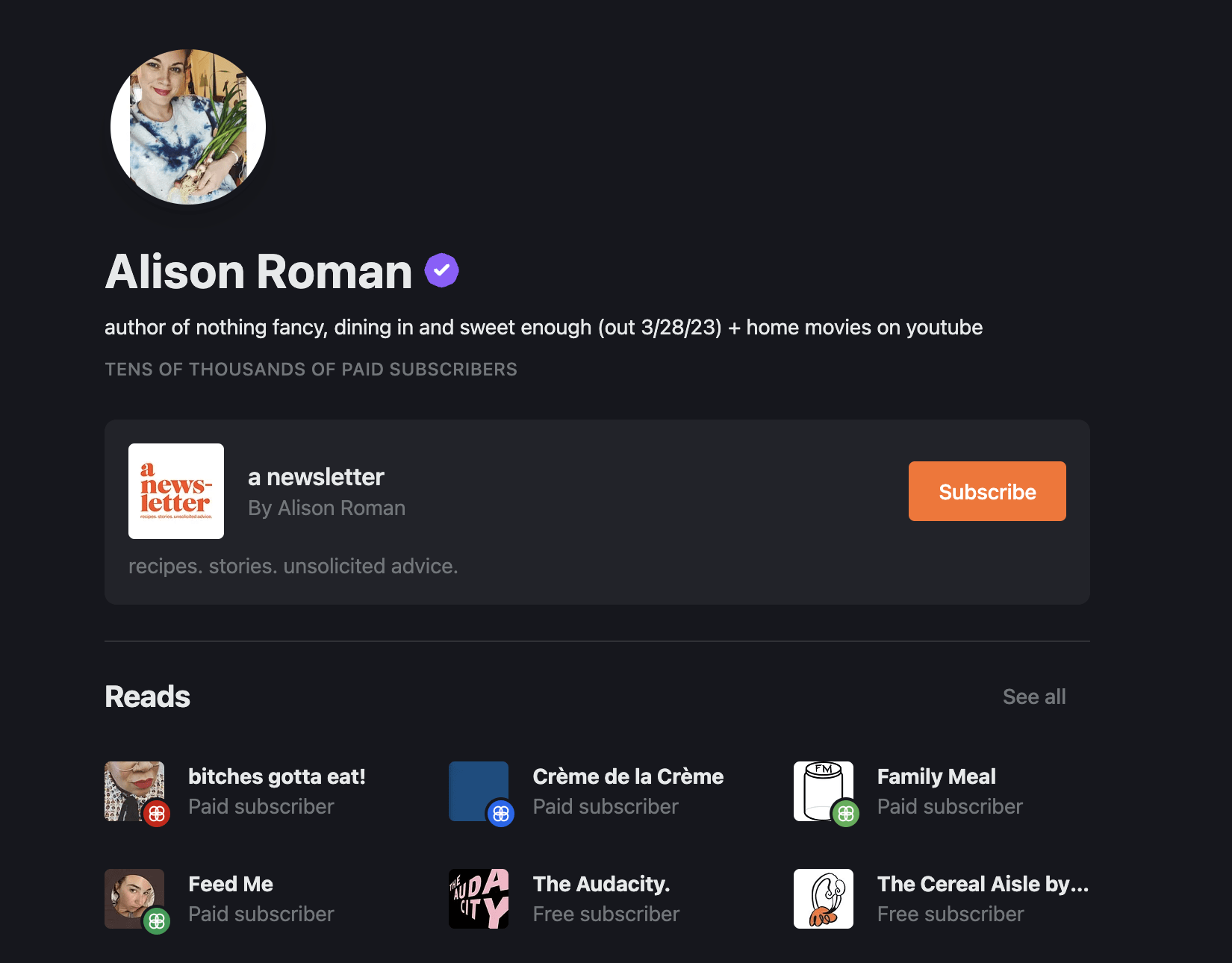
“With the explosion of Substack, paid newsletters have become a bigger fixture in the business, policy, and lifestyle content space,” says Trevor Ewen, COO at QBench.
“The dynamics of newsletters differ from click-and-scan web pages because the reader is more targeted and ready to invest in some long-form content. I would expect this content marketing trend to grow in sophistication and availability.”
Like Alison, you can jump on the paid newsletter trend and provide unique value or expertly curated content your audience won’t find for free on the web or other free newsletters.
9. A cultural shift to AI in Content Marketing
Once upon a time, content creation was tedious, costly, and frustrating. With AI content marketing tools, the process is faster and easier for all skill levels and business sizes.
“It will be interesting to see how businesses adapt to incorporate AI into their content marketing strategies to meet the growing cultural expectations of their customers,” says Matt Artz, a Business Anthropologist and Consultant.
“Integrating natural language generation (NLG) tools, like ChatGPT, and the widespread adoption of natural language understanding (NLU) to interpret customer feedback, preferences, and online behavior will be necessary for SMBs to remain competitive.”
You can incorporate artificial intelligence into your content strategy to:
Automate content creation from research to distribution
Gather user-generated content (UGC) while building brand awareness and strengthening customer relationships
Optimize your content for searchability and better performance
Find a stream of in-demand topic ideas and highly searched keywords
Offer personalization and deliver the tailored content and experiences your audience craves
Find an AI content editor for hire
10. Rise in conversational marketing
Conversational marketing is a dialogue-driven method that uses real-time conversations and customer-centric data to move buyers through your sales funnel. That way, you can create authentic and meaningful user experiences at each stage of the buyer's journey.
You can leverage different content formats of conversational marketing, including live video sessions and interactive webinars, to engage buyers effectively.
The traditional sales process alienated the buyer, forcing them through lead capture forms and long response times. Conversational marketing engages people when they’re on your site, making it easier to engage with and convert more leads.
In 2023, small businesses will continue to implement conversational marketing through intelligent chatbots and targeted messaging to engage with buyers around the clock.
Okta—an identity and access management platform—engages first-time and return site visitors with their chatbot so they can find what they need. The AI-enabled chatbot creates a personalized experience at every step of the buying journey, to shorten the sales cycles and close more revenue.
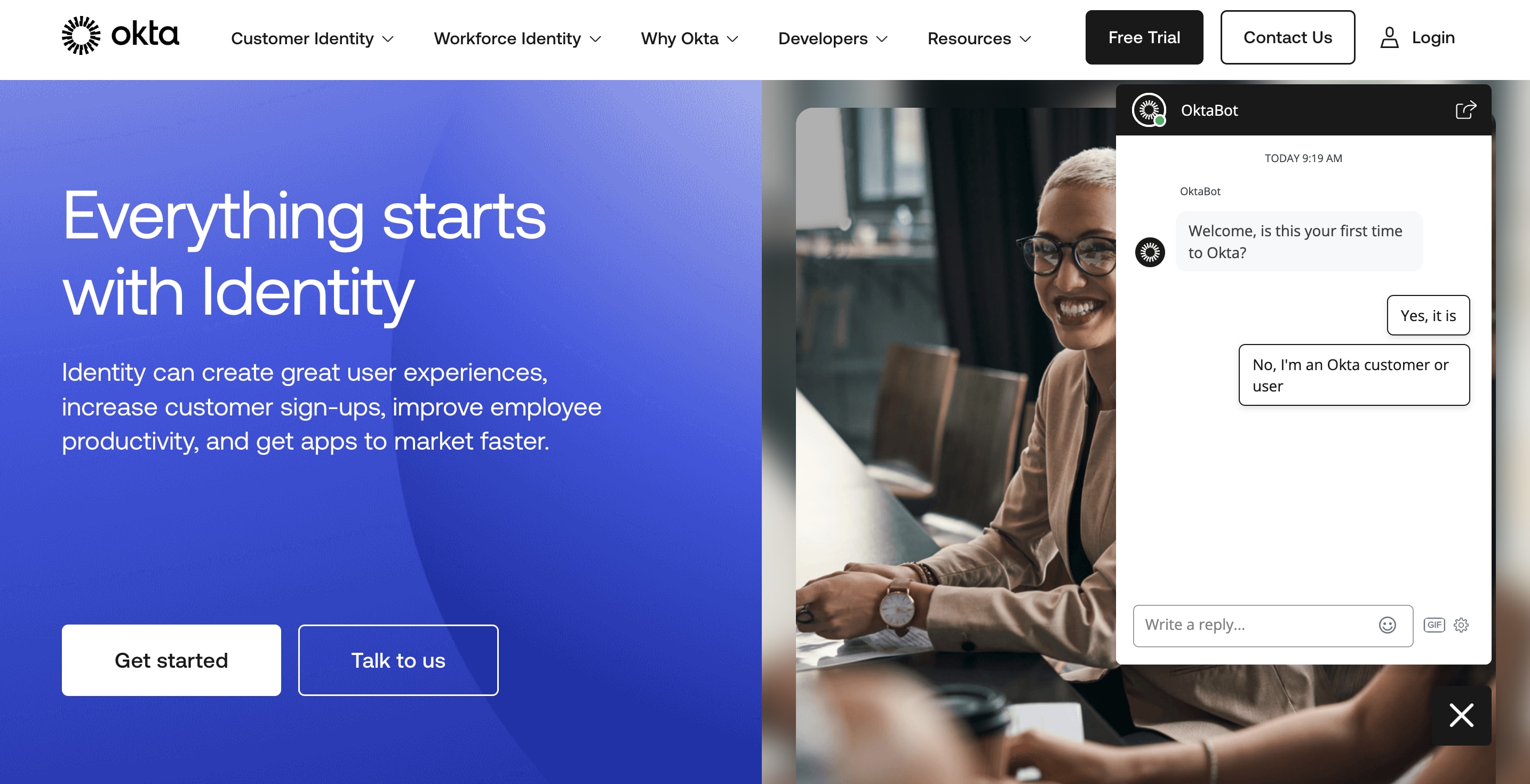
Using a custom hook, the bot gives several chat button options to understand the visitor’s needs, but you can also type in what you want. The bot then recommends the next steps, which include a meeting with sales or additional resources for visitors who aren’t ready to chat.
“ChatGPT will revolutionize the way small and medium-sized enterprises (SMEs) leaders approach content marketing in 2023,” says Shane McEvoy, Managing Director, Flycast Media.
“Conversational marketing is rising, and ChatGPT's AI-powered chatbot and messaging app solutions are poised to change the game for SMEs by providing personalized, real-time customer support that can help businesses build stronger relationships with their customers.”
Shane recommends using ChatGPT's conversation-based marketing tools to remain competitive in 2023 and the years to come.
12. Personal experience will become more important
Google recently added an E to its Expertise, Authoritativeness, and Trust (E-A-T) quality rater guidelines. The new E, which represents Experience, reflects how the search engine rates content quality, helpfulness, and relevance.
With this new change, businesses will have to use first-hand or life experience in their content to build trust and show proof of using a product or service.
Users want to see quality, engaging content produced by someone with actual experience on the topic. That way, Google can easily assess the search results and serve users with the content they need to feel empowered and make their purchasing decisions easier.
Experience can make the difference between a lead, conversion, sale, or none at all.
“Between Google's update and AI tools acting as a general knowledge base, the writer's experience will become even more important in content,” says Axel DeAngelis, Founder and Marketing Strategist of Jumpcoast.
“To differentiate their content, small business leaders should prioritize sharing stories, insights, and lessons learned from their journeys. Doing this will allow their content to resonate more deeply with their audience, as it provides a human connection that cannot be replaced by AI-generated content.”
There are many ways you can achieve E-E-A-T. If you run a law firm, for instance, you can add an About Us or Team page displaying your team’s expertise, education, professional involvement, awards, and credentials.
Here’s how Hogan Lovells showcases their team’s education, experience, awards and more on their team page.

The firm gives customers everything they need in an easy-to-understand way to feel they can trust them with their business. Doing this also helps Google easily build a picture of each team member and what they do.
Other ways you can achieve Experience include:
Linking to authoritative sources in your industry or other credible sites.
Keep blogging Add or update new content regularly to keep your site competitive and show Google you’re still in business.
Build topical content clusters to showcase expertise instead of using a single web page.
Link relevant content pieces around a subject together to make them useful for your audience based on what they might want to see or read next.
Consider creating videos, webinars, podcasts, and other types of content—not just words.
Engage expert content creators to help you create content that demonstrates experience. You can also interview subject matter experts and include their quotes in your content.
Get ahead of the curve
We’ve seen several key trends emerge this year.
Overall, AI, personal experience, and short-form video are among the top trends as businesses and consumers seek speed, efficiency, and authenticity in the content they create and/or consume.
Clearly, there are many opportunities for content marketing and a lot of optimism for the year ahead.
Not sure how to use these trends to your company’s advantage? Don’t fret. Fiverr is here to help. Our digital marketplace is home to a variety of best content marketing specialists who can help you capture these trends and implement them in your content strategy.
Sign up for Fiverr to find content marketing talent for your business.



